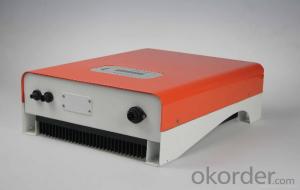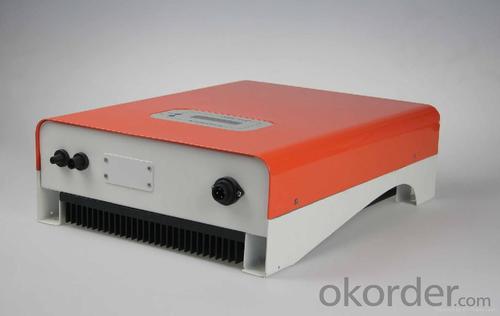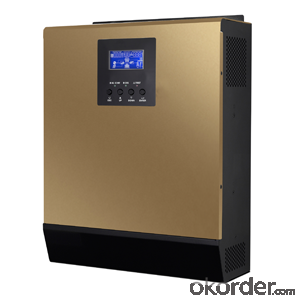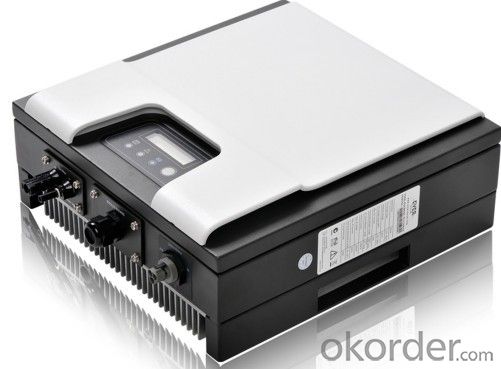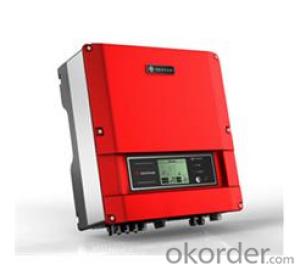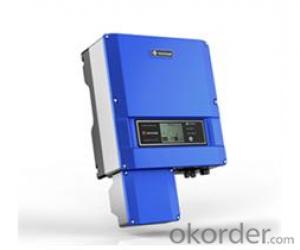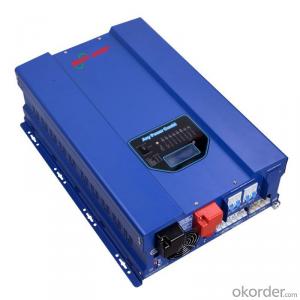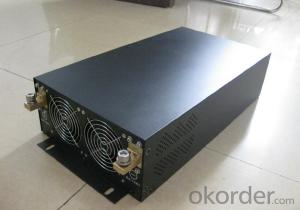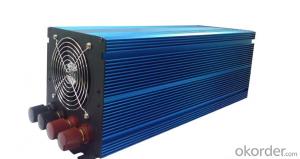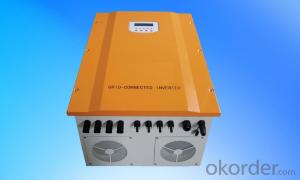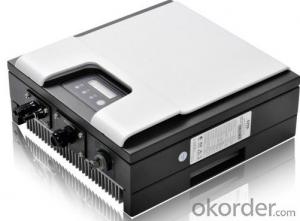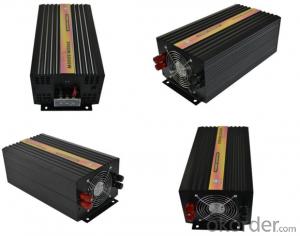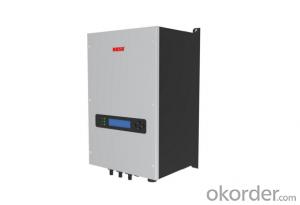All in One Solar Inverter - 3 Phase Inverter Second Generation 6k Solar Inverter Made in China
- Loading Port:
- Shanghai
- Payment Terms:
- TT OR LC
- Min Order Qty:
- 0 watt
- Supply Capability:
- 10000 watt/month
OKorder Service Pledge
OKorder Financial Service
You Might Also Like
Description of Three Phase Inverter Second Generation 6k Solar Inverter
Solar ac power system consists of solar panels, charge controllers, inverter and battery; Solar energy does not include inverter dc power system. Inverter is a kind of power conversion device, inverter by incentives can be divided into self-excited oscillation inverter and separately excited oscillation inverter.
Features of Three Phase Inverter Second Generation 6k Solar Inverter
Standard 10 years warranty, 5-15 years optional
Built-in Gprs as option
Built-in Wifi as option
Smaller and lighter, only 18kg
High performance DSP for algorithm control
VDE-AR-N 4105 certification
New topology design
Dual MPPT design
Multi-button touch interface
LCD screen visible at night
Have anti-shading function
Advantages of Three Phase Inverter Second Generation 6k Solar Inverter
Longer life cycle
Plug and play
Free monitoring through our webportal
Very lower internal temperature
Easy transportation and installation
Faster CPU speed
Adjustable active and reactive power
Maximum conversion effciency up to 98.3%,Euro up to 97.7%
More flexible system design
User friendly operation
Technical Data of Three Phase Inverter Second Generation 6k Solar Inverter
| Type | Omniksol-6k-TL2-TH |
| Input(DC) | |
| Max.PV Power | 6300W |
| Max,DC Voltage | 1000V |
| Nominal DC Voltage | 640V |
| Operating MPPT Voltage Range | 150-800V |
| MPPT Voltage Range at Nominal Power | 270-800V |
| Start up DC Voltage | 180V |
| Turn off DC Voltage | 150V |
| Max, DC Current(A/B) | 11A/11A |
| Max, Short Cicuit Current for each MPPT | 16A/16A |
| Number of MPP trackers | 2 |
| Number of DC Connection | A:2/B:2 |
| DC Connection Type | MC4 connector |
| Output(AC) | |
| Max,AC Apparent Power | 6000VA |
| Nominal AC Power (cos phi = 1) | 6000W |
| Nominal Grid Voltage | 220V/230V/240V |
| Nominal Grid Frequency | 50Hz/60Hz |
| Max, AC Current | 9.2A |
| Grid Voltage Range** | 185-276V |
| Grid Frequency Range** | 45-55Hz/55-65Hz |
| Power Factor | 0.9 capacitive... 0.9 inductive |
| Total Harmonic Distortion(THD) | <2% |
| Feed in Starting Power | 30W |
| Night time Power Consumption | <1W |
| Standby Consumption | <10W |
| AC Connection Type | Plug-in connertor |
| Efficiency | |
| Max,Efficiency | 98.2% |
| Euro Efficiency | 97.5% |
| MPPT Efficiency | 99.9% |
| Safety and Protection | |
| DC Insulation Monitoring | Yes |
| DC Switch | Optional |
| Residual Current Monitoring Unit (RCMU) | Integrated |
| Grid Monitoring with Anti-islanding | Yes |
| Electricity Fuse Protection | Yes |
| Protection Class | Ⅰ(According to IEC 62103) |
| Overvoltage Category | PVⅡ/Mains Ⅲ(According to IEC 62109-1) |
| Reference Standard | |
| Safety Standard | EN 62109, AS/NZS 3100 |
| EMC Standard | EN 6100-6-1, EN 6100-6-2, EN 6100-6-3 EN 6100-6-4, EN 6100-3-2, EN 6100-3-3 |
| Grid Standard | VDE-AR-N4105. VDE-0126-1-1,G83/1,EN 50438,RD1699,CEI 0-21, AS4777,C10/C11 |
| Physical Structure | |
| Dimensions | 352x421x154.5mm |
| Weight | 18kg |
| Environmental Protection Rating | IP 65 (According to IEC 60529) |
| Cooling Concept | Natural convection |
| Mounting Information | Wall bracket |
| General Data | |
| Operating Temperature Range | -25℃ to +60℃(derating above 45℃) |
| Relative Humidity | 0% to 98%, no condensation |
| Max. Altitude (above sea level) | 2000m |
| Noise Type | <40dB |
| Isolation Type | Transformerless |
| Display | 20 x 4 LCD (800x480 TFT Graphic Display optional) |
| Data Communication | RS485(WiFi, GRPS optional) |
| Computer Communication | USB |
| Standard Warranty | 10 Years (5-15 years optional) |
IMages of Three Phase Inverter Second Generation 6k Solar Inverter
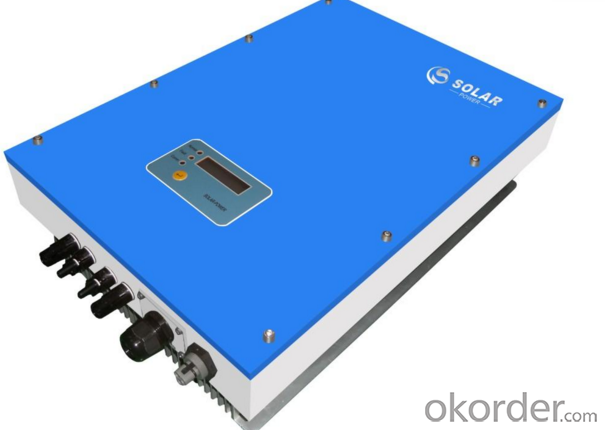
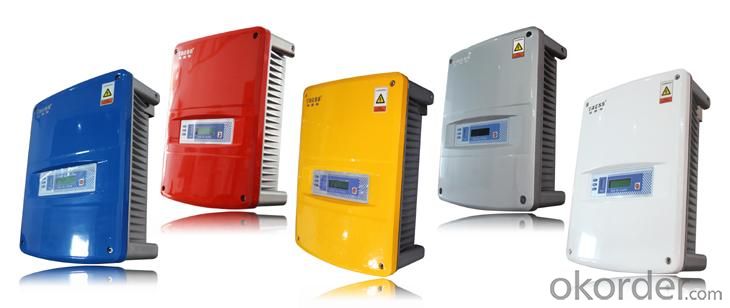
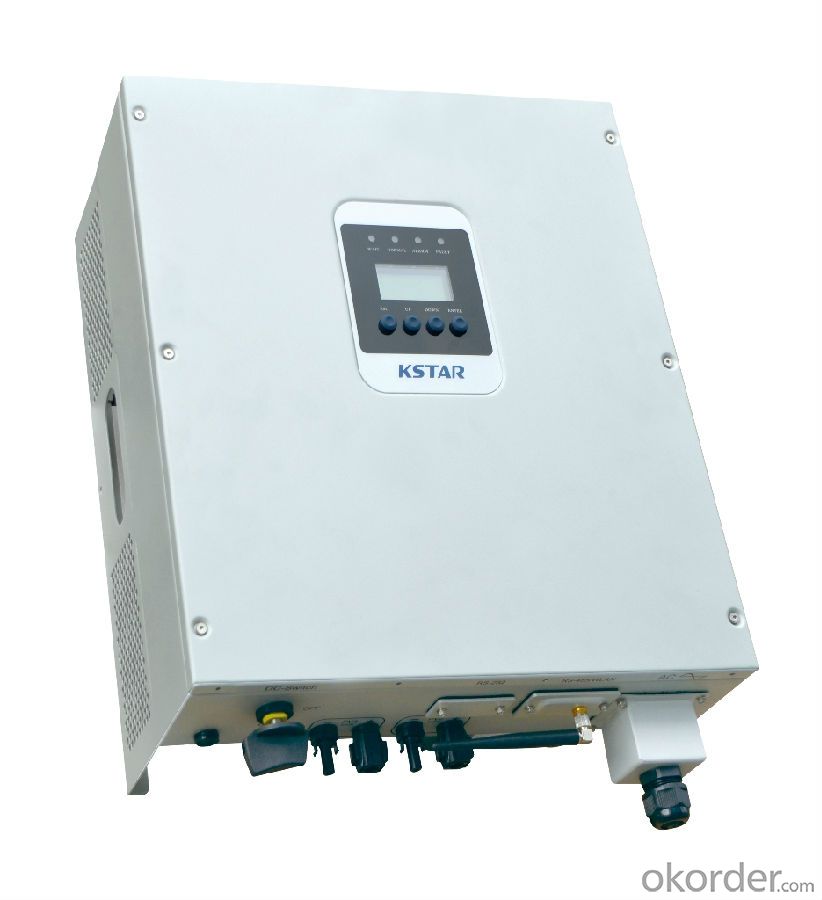
FAQ
Q: Do you have the CE, TUV, UL Certification?
A: We’ve already passed all the tests, and any certificate is available.
Q: Have you ever sold your products to companies in my country?
A: Of course, we have customers in all general PV markets, but I think we should expand our market share along with the market growth.
Q: When did your company set up? You are a new company, how can I believe your quality?
A: We entered into Solar PV industry in 2005, now we have several plants in manufacturing of a-Si and c-Si panels, and our capacity is 220MW per year. Till now we have already passed all the tests by authorized laboratories, e.g. TUV, CE, UL.
Q: Can you help us install the module if we cooperate with you?
A: We haven’t entered into installation sector, but we have the plan in near future.
Q: How do you pack your products?
A: We have rich experience on how to pack the panels to make sure the safety on shipment when it arrives at the destination.
Q: Can you do OEM for us?
A: Yes, we can.
Q: Can we visit your factory?
A: Surely, I will arrange the trip basing on your business schedule.
- Q: What is the role of an anti-islanding function in a solar inverter?
- The role of an anti-islanding function in a solar inverter is to ensure the safety of utility workers and prevent damage to the grid. It detects when there is a loss of connection to the grid and immediately shuts down the inverter, preventing it from continuing to supply power to the grid during a power outage. This is crucial because it prevents a potential dangerous situation called islanding, where the inverter continues to generate power and creates a false grid, posing risks to utility workers who may be working on the grid. By shutting down the inverter during an outage, the anti-islanding function helps maintain the stability and integrity of the electrical grid.
- Q: What is the importance of overcurrent protection in a solar inverter?
- The importance of overcurrent protection in a solar inverter is to ensure the safety and longevity of the system. Overcurrent protection helps prevent damage to the inverter and other components by interrupting the flow of excessive current. It safeguards against potential hazards such as overheating, electrical fires, and equipment failures. Additionally, overcurrent protection helps maintain the efficiency and performance of the solar inverter, ensuring optimal power generation and system reliability.
- Q: What is the operating temperature range of a solar inverter?
- The operating temperature range of a solar inverter typically varies between -20°C to 60°C (-4°F to 140°F).
- Q: Can a solar inverter be used in three-phase systems?
- Yes, a solar inverter can be used in three-phase systems. Three-phase systems are commonly used in industrial and commercial applications, and solar inverters are available in both single-phase and three-phase configurations to accommodate these systems. The three-phase solar inverter converts the direct current (DC) generated by the solar panels into alternating current (AC) that is compatible with the three-phase power grid.
- Q: How does a solar inverter handle fluctuations in solar panel output due to temperature changes?
- A solar inverter handles fluctuations in solar panel output due to temperature changes by employing a maximum power point tracking (MPPT) algorithm. This algorithm continuously adjusts the operating voltage and current of the inverter to ensure that it operates at the maximum power point of the solar panels, despite the temperature changes. By dynamically adapting to the varying output of the panels, the inverter optimizes the energy conversion process and allows for efficient utilization of the available solar energy.
- Q: Can a solar inverter be used in regions with extreme weather conditions?
- Yes, solar inverters can be used in regions with extreme weather conditions. However, the durability and performance of the inverter may vary depending on the specific weather conditions. It is important to choose a solar inverter that is designed to withstand the extreme weather conditions of the region, such as high temperatures, strong winds, heavy rain, or snow. Additionally, proper installation, regular maintenance, and protection from harsh weather elements can help ensure the longevity and efficient operation of the solar inverter in extreme weather conditions.
- Q: Can a solar inverter be used in remote locations?
- Yes, solar inverters can be used in remote locations. They are designed to convert the direct current (DC) power generated by solar panels into usable alternating current (AC) power, which can be used to power electrical devices. Solar inverters can be installed in remote areas where there is no access to the main power grid, allowing for the generation and utilization of electricity in off-grid locations.
- Q: Can a solar inverter be installed indoors or outdoors?
- A solar inverter can be installed both indoors and outdoors, depending on the specific requirements and preferences of the installation.
- Q: Can a solar inverter be used with different types of communication interfaces?
- Yes, a solar inverter can be used with different types of communication interfaces. Many modern solar inverters are designed to be compatible with various communication protocols such as Wi-Fi, Ethernet, RS485, and Zigbee. This allows for easy integration and monitoring of the inverter with different types of communication systems and devices.
- Q: How much maintenance is required for a solar inverter?
- Solar inverters typically require very little maintenance. They are designed to be reliable and durable, requiring minimal attention throughout their lifespan. Regular visual inspections to check for any debris or dust accumulation, as well as ensuring proper ventilation, are recommended. Additionally, monitoring the inverter's performance through software or online platforms can help identify any potential issues. However, in general, solar inverters are known for their low maintenance requirements, making them a reliable choice for renewable energy systems.
Send your message to us
All in One Solar Inverter - 3 Phase Inverter Second Generation 6k Solar Inverter Made in China
- Loading Port:
- Shanghai
- Payment Terms:
- TT OR LC
- Min Order Qty:
- 0 watt
- Supply Capability:
- 10000 watt/month
OKorder Service Pledge
OKorder Financial Service
Similar products
Hot products
Hot Searches
Related keywords
